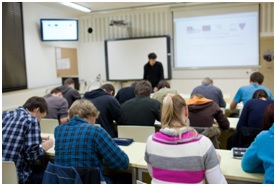Feedback n°1
April 2013
Authors : Luc Behaghel, Clément de Chaisemartin, Axelle Charpentier, Marc Gurgand
Contact : luc.behaghel@ens.fr; clement.dechaisemartin@ensae.fr; acharpentier@povertyactionlab.org; gurgand@pse.ens.fr
…………………………
For more than 3 years, researchers have led an experimentation, funded by le Fonds d’expérimentation pour la jeunesse, in order to estimate the impact on students of the programme “internat d’excellence” in Sourdun. They show that an ambitious educational policy can have major results, but they underline that this policy doesn’t have impact, as for now, on the weakest students.
………………………..
 “Internats d’excellence : Lessons from Sourdun”
“Internats d’excellence : Lessons from Sourdun”
…………………………
Summary :
The Sourdun Internat d’excellence (Boarding for Excellence) programme opened its doors at the beginning of the 2009 school year. The 258 first boarders were drawn by lot from 395 eligible applicants. Over two years, we followed the interns and the 137 unsuccessful applicants. The latter constitute our “control” group. The draw guarantees that the two groups are initially identical, which allows us to isolate effects of Sourdun reliably, by comparing the interns with the control group students.
Selected first for their motivation, the Sourdun students are of modest backgrounds and modest academic achievements. The boarding programme demanded some time for adaptation, so much so that little effect was seen in the first year. It was at the end of two years that a significant improvement in results in mathematics appeared among the Sourdun students compared with the others, along with increased academic ambition and a stronger desire to learn. In French, however, the interns did not have higher marks than the control group students. Several studies of other education policies have also found positive effects on results in maths but not in languages: the strengthening of verbal skills is perhaps to be conceived over the long term.
A number of factors explain the impressive impact of the Sourdun programme. Two of them are likely to be connected: the enabling environment (low absenteeism, fewer acts of violence within the school) and the high investment by teachers and students in their own work, the study programme and the individual support available.
By its nature, Sourdun remains an exception. But its effectiveness is a solid invitation to experiment with other measures to fight on a larger scale against academic inequalities.
Key points :
- Bringing together motivated middle school-level students, Sourdun clearly increases maths skills and boarders’ academic ambitions, but only after two years.
- Its cost effectiveness is equal to reducing class sizes by half.
- The work environment provided for the students seems essential: coaching, individual support, improvement of relations between the pupils and the teachers.
- We cannot say whether the boarding programme would have the same effects on weaker or less motivated students, which leaves open the question of academic policies aimed at a wider target.
Related publications :
- Download the Press release (in French) of this experimentation
- Read the full report: http://www.povertyactionlab.org/fr/evaluation/sourdun-internats-excellence
Ce message est également disponible en :  French
French


